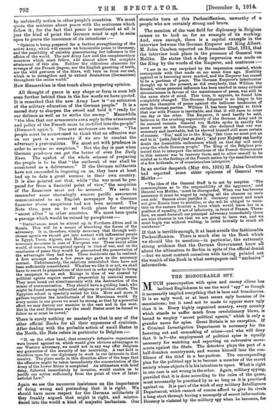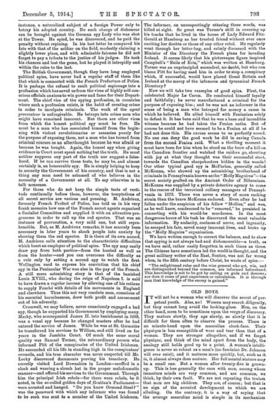THE HONOURABLE SPY.
MUCH preoccupation with spies and enemy aliens has inclined Englishmen to use the word " spy" as though it necessarily implied everything that is base and treacherous. It is an ugly word, or at least seems ugly because of its associations; but it need not be made to appear more ugly than it is. Every highly organized country, every country which stands to suffer much from revolutionary blows, is bound to employ " secret political agents," which is only a grander name for spies. Great Britain is no exception. If a Criminal Investigation Department is necessary for the ferreting out and unmasking of crime—and who will deny that it is P—the employment of political spies is equally necessary for watching and reporting on subversive move- ments against the State. The detective plays the part of a half-drunken countryman, and worms himself into the con- fidence of the thief in a bar-parlour. The corresponding plan for the political spy is to become a member of the secret society whose objects it is his intention to upset. What is right in one case is not wrong in the other. Again, military spying, provided that it is done according to the rules of the game, must necessarily be practised by ns so long as it is practised against us. It is part of the work of any military Intelligence Department, which cannot of course afford to give its rivals a long start through having a monopoly of secret information. Decency is violated by the military spy when he becomes, for
instance, a naturalized subject of a foreign Power only to betray his adopted country. No such charge of dishonour can be brought against the German spy Lody who was shot at the Tower. He spied, he was discovered, and he paid the penalty without repining. In his last letter he compared his fate with that of the soldier on the field, modestly claiming a slightly lower place, and with admirable fairness he did not forget to pay a tribute to the justice of his judges. He took his chances and lost the game, but he played it intrepidly and within the rules to the last.
The British Government, though they have long employed political spies, have never had a regular staff of them like that which is connected with the French Prefecture of Police.
It is perhaps the refusal to exalt political espionage into a profession which has saved us from the vices of highly self-con- scious officials anxious to win power and fame for their Depart- ment. The chief vice of the spying profession, in countries where such a profession exists, is the habit of creating crime
in order to inculpate criminals. The work of the agent provocateur is unforgivable. He betrays into crime men who might have remained innocent. But there are other vices
from which the honest political spy must be free. He must be a man who has associated himself from the begin- ning with violent revolutionaries or assassins purely for the purpose of exposing them, not a man who has turned from criminal courses as an afterthought because he was afraid or because be was bought. Again, the honest spy when giving evidence in Court must speak nothing but the truth. He must neither suppress any part of the truth nor suggest a false- hood. If he can survive these tests, he may be, and almost certainly is, an honourable spy. He is simply helping to keep in security the Government of his country, and that is not a thing any man need be ashamed of who believes in the necessity of a Government at all. To say otherwise is to talk nonsense.
For those who do not keep the simple tests of recti- tude continually before them, however, the temptations of all secret service are various and pressing. M. Andrieux, formerly French Prefect of Police, has told us in his very frank memoirs how one of the French secret agents organized
a Socialist Committee and supplied it with an attractive pro- gramme in order to call up the red spectre. That was an instance of provocation, a very mild one, but still repre- hensible. But, as M. Andrieux remarks, it has scarcely been necessary in later years to shock people into anxiety by showing them the red spectre. It is there of its own accord, M. Andrieux calls attention to the characteristic difficulties which beset an employer of political spies. The spy may easily
draw pay from both parties—from the hunted as well as from the hunter—and you can overcome the difficulty as a rule only by setting a second spy to watch the first.
'Wellington used to express his conviction that his chief spy in the Peninsular War was also in the pay of the French.
A still more astonishing story is that of the banished Louis XVIIL, who during the reign of Napoleon I. is said to have drawn a regular income by allowing one of his retinue to supply Fouche with details of his movements in England and elsewhere. Thus this not very resolute man, conscious of his essential harmlessness, drew both profit and amusement out of his adversity.
Cromwell, we may believe, never consciously engaged a bad spy, though be supported his Government by employing many.
Macky, who accompanied James II. into banishment in 1688, was a venal spy because he changed masters after he had entered the service of James. While he was at St. Germaine he transferred his services to William, and still lived on for years in the Jacobite Court. Of much the same moral quality was Samuel Turner, the extraordinary person who informed Pitt of the conspiracies of the United Irishmen.
He succeeded all his life in standing high in the conspirators' councils, and his true character was never suspected till Mr.
Lecky discovered documents proving his treachery. He secretly visited Lord Downshire in London—muffled in a cloak and wearing a slouch hat in the proper melodramatic manner—and offered his services to the Government. Through him the principal Irish rebels—for there were rebels, be it noted, in the so-called golden days of ,Grattan's Parliament— were arrested and hanged. "Do you know Ormond Steel? " was the password with which any informer who was found to be such was sent to a member of the United Irishmen.
The informer, on unsuspectingly uttering these words, was killed at sight. So great was Turner's skill in covering up his tracks that he lived in the house of Lady Edward Fitz- Gerald at Hamburg as her trusted friend without ever once exciting her doubts or those of any other rebel. Ho regularly went through her letter-bag, and calmly discussed with the Minister of the Directory the French plans for invading Ireland. It seems likely that his picturesque figure inspired Campbell's "Exile of Erin," which was written at Hamburg.
Turner was an unprincipled scoundrel, no doubt, but who can blame Pitt for having used him in order to stop a conspiracy which, if successful, would have placed Great Britain and Ireland at the mercy of the infamous and tyrannical French Directory ?
Now we will take two examples of good spies. First, the celebrated Major Le Caron. He conducted himself loyally and faithfully ; be never manufactured a criminal for the
purpose of exposing him ; and he was not an informer in the sense of being a man who betrayed for money a cause in which he believed. He allied himself with Fenianism solely to defeat it. It has been said that be was a base and incredible witness because he had taken the Fenian oaths. But of course he could not have seemed to be a Fenian at all if he had not done this. His excuse seems to us perfectly sound. No one can deny the good work he did in saving Canada from the second Fenian raid. What a thrilling moment it must have been for him when he stood on the brow of a bill on the Canadian frontier and watched the raiders go, shouting
with joy at what they thought was their successful start, towards the Canadian sharpshooters hidden in the woods ! Our other typical good spy is McParlan, generally called McKenna, who showed up the astonishing brotherhood of criminals in Pennsylvania known as the " Molly Ma guires "—the secret society grafted on the Ancient Order of Hibernians.
McKenna was supplied by a private detective agency to come to the rescue of the terrorized colliery managers of Pennsyl- vania in 1873. There was never a story of more racking strain than the brave McKenna endured. Even after he had fallen under the suspicion of his fellow " Mollies," and was, as he well knew, condemned to be " removed," he persisted in consorting with his would-be murderers. In the most dangerous hours of his task he discovered the most valuable information. By audacity, coolness of nerve, and ingenuity, he escaped his fate, saved many innocent lives, and broke up the "Molly Maguire" organization.
We have written enough to correct the balance, and to show that spying is not always bad and dishonourable—a truth, as
we have said, rather easily forgotten in such times as these. The Chinese have sometimes led the world in thought, and the great military writer of the East, Suntzu, was not far wrong when, in the fifth century before Christ, he wrote of spies;— "The enlightened ruler and the wise general who act, win, and are distinguished beyond the common, are informed beforehand. This knowledge is not to be got by calling on gods and demons; nor does it come of past experience or calculation. It is through men that knowledge of the enemy is gained."



























































 Previous page
Previous page